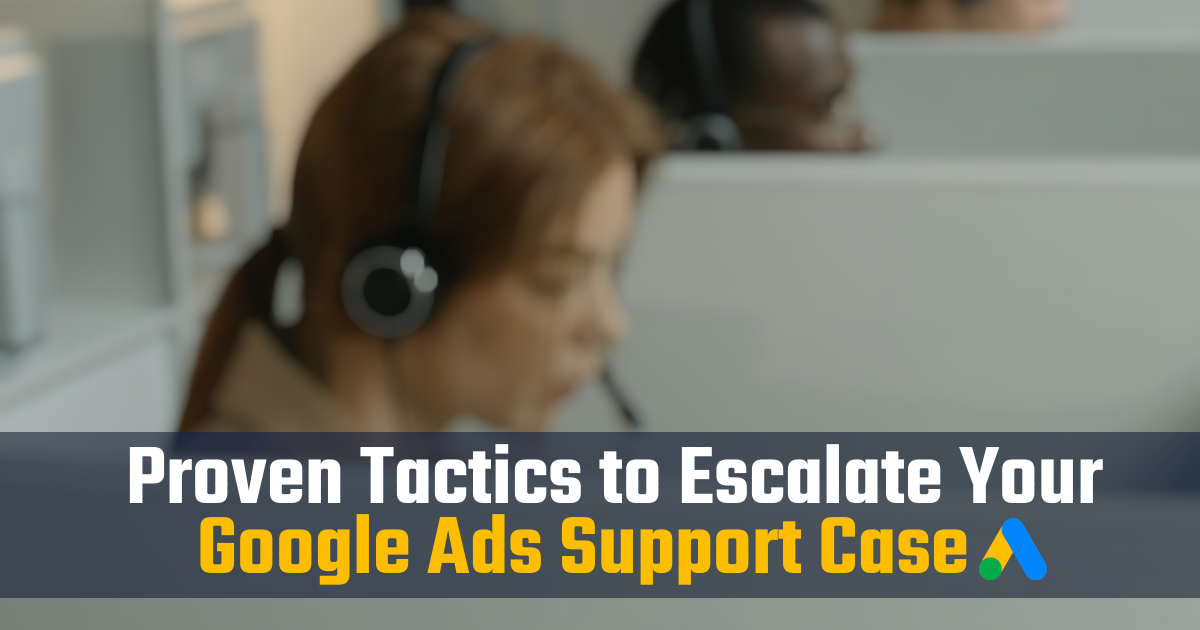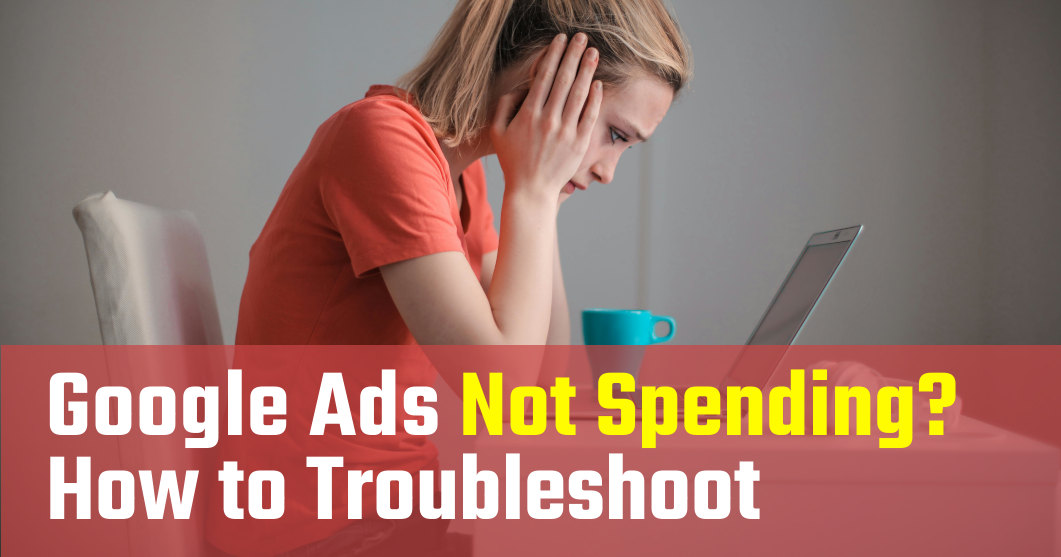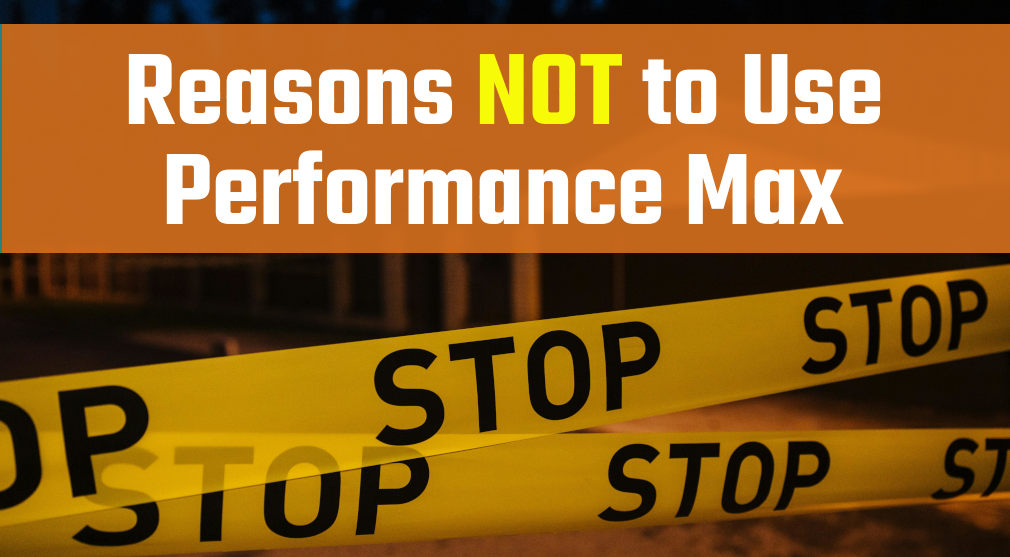A common misconception about using Google Ads is that you need to spend a ton of money to see results. But this is rarely true, except for some e-commerce/shopping campaigns or industries with very high costs per click (CPCs).
In this blog post, I explain why this myth exists and how to approach your Google Ads campaign even if your budget is less than $500, $200 or even $50 a month (yes, really).
The Weird Myth about the Cost of Google Ads
I have been managing Google Ads accounts for nearly two decades – both for my own businesses and for companies around the globe.
In that time, I have repeatedly heard the question “Does Google Ads work on a small budget?”
For me, the answer has always been a clear yes (For the purposes of this post, I’m mostly referring to lead-generation campaigns, not e-commerce – see my caveats below). But over the years, I’ve heard some really weird misconceptions about the cost of Google Ads and how much you need to spend to see a return on your investment. One of the weirdest myths—which I continue to hear—goes something like this:
“You need to spend at least $2,000 a month to see results with Google Ads!”

Huh?
Why?
While it’s true spending more on Google Ads will generally produce a greater ROI, there is no required minimum ad spend to see results.
Yes, some businesses will need to spend more on clicks (I’ll return to that in a minute), which may require a more long-term strategy if the budget is limited. But again, in most cases, you don’t need to spend that much, especially if your budget is limited and you just want to test out Google Ads before ramping up your budget.
Related posts:
- How Much Should You Spend on Google Ads?
- Google Ads Not Spending? Here’s What to Check
- How Much Do Google Ads Cost?
So, What Does Google Ads Actually Cost?
This is the beauty of Google Ads and pay-per-click campaigns. The cost is really up to you.
With Google Ads, you have control over how much you spend each day. You only pay for clicks, and you have control over how much you pay for each of those clicks.
Contrary to what some #ppc agencies will tell you, you don't need to spend thousands a month to see results from #GoogleAds. Here's our advice for small businesses who want to start with a small budget of $200 or even less.https://t.co/ZXgd0jhncu https://t.co/CikQGWvHiT
— Michael Marlin Jr. 🤓 (@mikemarlinjr) March 25, 2024
Admittedly, some factors are out of your control.
Since Google Ads is a bidding system, your click costs are affected by other advertisers bidding on the same keywords. The more competition you have, the higher your click costs.
But you still maintain control over those costs. You can choose to adjust your bids up or down, and set any budget you want (or let Google’s machine learning do it for you).
So if you only want to spend $1 a day, that’s completely your choice. There are some performance factors to consider, but we’ll get to that below.
‘What if I Only Want to Spend $100 a Month on Google Ads?’
Yes, that’s fine (with the exception of high-CPC industries or e-commerce/shopping campaigns, which do often require larger budgets, especially if you’re competing with other big advertisers like Amazon).
Don’t listen to other PPC agencies when they say you need to spend thousands to get results. If that were true, it would go against all the principles that Google Ads is built upon.
Over the years, I’ve helped businesses who have started with as little as 50 bucks. In fact, I love these types of clients, because it allows me to prove what Google Ads can do for their businesses. When they see the returns that are possible, they increase their budgets accordingly, because the ads pay for themselves.
My role as a Google Ads manager is to help these businesses see the value of Google ads no matter what their budgets.
Wait. So, Where Did That Myth Come From?
There are a few reasons why a PPC agency might suggest you need to spend thousands a month to get results from Google Ads:
- Those agencies are incentivized to push you to spend more. Most Google Ads management companies (including MarlinSEM) have tiered pricing packages. The more you spend in Google Ads, the more the agency earns. This is actually a good thing, because it means the agency is incentivized to produce results for you. But the downside is that some agencies aren’t willing to put in the work for a small business that has a limited budget. This brings us to the next reason:
- It’s not worth it for large agencies to help businesses that have a $50 budget. Larger agencies have way more overhead and, frankly, can’t afford to work with those smaller companies. Their target clients are the big, enterprise businesses that spend tens of thousands of dollars on paid search marketing.
- If you’re hiring a PPC agency to manage your ads, then remember to factor in the added cost of the management fee. If the agency’s fee is significantly higher than your planned ad budget, then this is another reason why the agency might suggest you need to “spend more” to make it work. That’s partially true, from a cost-efficiency standpoint, but it could also be that the agency’s fees are unnecessarily high. Try using a single PPC specialist (like MarlinSEM) or self-managing your ad campaign.
- Some industries do incur much higher click costs. This is a legitimate factor that affects these businesses’ ability to see a return from a very small ad budget. But it still doesn’t always mean they need to spend more.
Let’s focus on that last reason a little more closely, since it’s the most legitimate factor affecting ad spend.
The Challenges of High Click Costs
It’s precisely because of Google Ads’ effectiveness that makes it cost more for some advertisers. When the returns are big, advertisers are willing to spend more to get the click. And since it’s a bidding system, this increases click costs for everyone else.
- We recently worked with a Florida injury lawyer using Google Ads who was spending between $80 to $100 per click for his most valuable keywords. That’s far higher than the average cost per click (CPC) of $2.69 for all industries using search ads (Source: Wordstream).
- Same for plumbers using Google Ads. Click costs for plumbers are notoriously high – sometimes reaching $30 or more per click in some markets. Again, this is due to high competition from other advertisers: not just local plumbing companies, but also national advertisers like Roto-Rotter and Home Depot, plus lead-generation companies and aggregators (that’s a blog post for another day!).
- Google Ads for Locksmiths? Same story. We’ve seen clicks hit $20 or more in some markets. But again, these advertisers are willing to pay these amounts when they convert into well-paying service calls.
When plumbers can successfully book a $300-$700+ job after a few clicks, then it’s worth it to them to spend the 30 bucks a click. Same for injury lawyers, who stand to earn large windfalls from big cases that originate from people searching for legal services on Google.
However, this is a good example of a scenario in which advertisers may need a higher budget to start. If you’re in an industry with unusually high click costs, then you’ll need to budget accordingly. Because remember that not every click will translate into a call. And not every call will translate into a purchase.
A Caveat about E-commerce & Shopping Campaigns
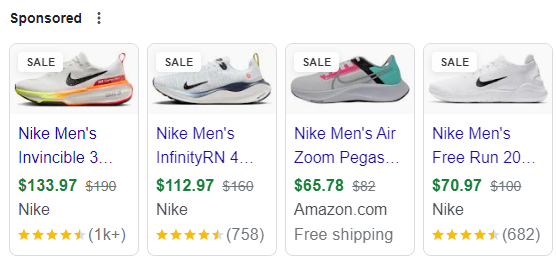
Example of Google Shopping Ads.
Shopping campaigns are an another important caveat here. They’re different from Search campaigns in that the ads are focused on individual products: the products in your online store that are linked to a Google Merchant Center account. There’s no headline-writing or keywords to enter. You tell Google which products to advertise, and Google largely handles the rest. It uses the information in your “product feed” (based on your product info and keywords in your product-page descriptions) to show your ads to customers searching for your products.
Generally speaking, shopping ads often have lower costs per click. But if you’re selling products that are widely available elsewhere (especially from major retailers), then these clicks can get very competitive. And if your profit margins are small, then it will be difficult to make a profit, especially with a small budget. Every campaign is different, of course, but this is a case where a larger budget is often necessary (along with healthy profit margins).
7 Tips if Your Google Ads Budget is $500 or Less
Okay, so what do you do if you want to try Google Ads, but you only want to spend $200-$300 to see how it works?
Can you actually see results from spending only $200?
Absolutely. In fact, if you see zero results (or zero potential) after spending $200, then your campaign probably needs a different strategy.
Here’s how to approach it:
1) Use a Search campaign (for lead gen)
Not Performance Max. Not Display ads. Not videos, banners or demand-gen. If you want the highest conversion rates possible, then you generally need to use a Search campaign. This allows you to target the people who are actively searching for what you offer, right at that moment. (See our related post: Performance Max vs. Search Campaign: Which is Best?) There are some exceptions to this, of course. For some advertisers, PMax can generate conversions at a lower cost. This can be helpful for small-budget advertisers who want build up conversion data before launching a Search campaign with Smart bidding. But it really depends on the niche: PMax does not work for every advertiser.
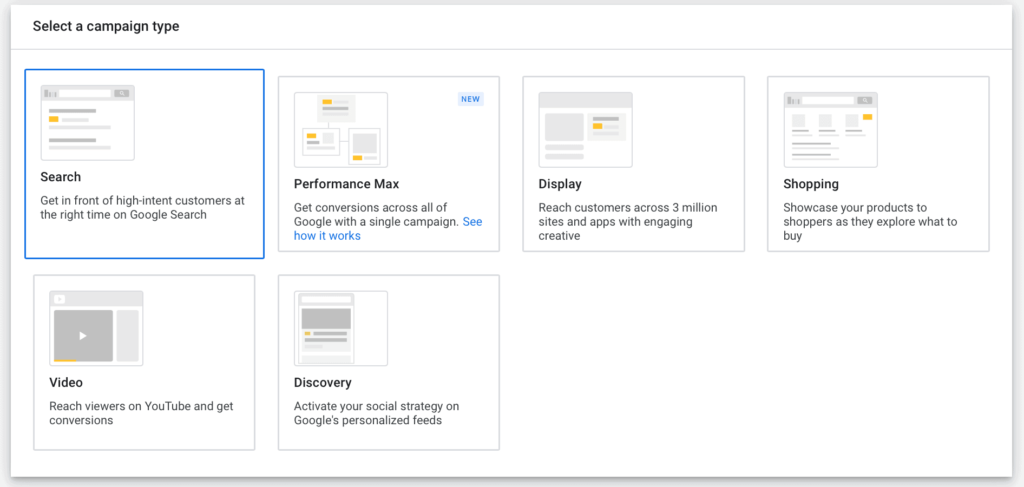
2) Target a single keyword group
Keep your campaign as narrow as possible. The goal is to get the biggest campaign for the buck. So you don’t waste a single click on irrelevant searches or “casual” shoppers. Before launching the campaign, use Google Ads Keyword Planner tool to research your keywords, including estimated CPCs and competition. Target a keyword phrase that has low competition but has the highest potential ROI. More on that in the next tip:
3) Advertise your highest-ROI offering
As long as the CPC isn’t too high, target the keywords that are likely to generate the biggest return. For example, if you’re running Google Ads for an HVAC company, avoid general terms for “HVAC companies near me” or “air conditioner repair.” Think bigger. Try “geothermal heat pump installers” or whichever service is most likely the net the biggest job.
4) Use narrow long-tail keywords
“Geothermal heat pump installers” is a great start. But can you make it even more specific? How about adding some variations with brand names, like “Carrier Geothermal heat pump installer” or “Bosch Geothermal heat pump HVAC installation?” This will get you clicks from people who are already informed, know what they want and are ready to hire an installer.
5) Use exact match keywords
Match types in Google Ads don’t have the same power as they used to. But using Exact Match can still help you to restrict your targeting to the specific keywords you want. If you use Broad Match or Phrase Max, you’re more likely to get clicks from other, unwanted searches.
6) Set a maximum CPC bid limit
If you’ve done your keyword research, then you should know approximately how much your clicks will cost. When choosing your bid strategy, consider selecting “Maximize clicks” or “manual bidding” and enter a maximum CPC bid limit. This lets you control how much you pay for each click. Start your bids low and see if you get any clicks. If you do, try going even lower. If you don’t get clicks, raise them higher until you do. Remember: your bids effect the visibility of your ads. A lack of clicks doesn’t necessarily mean your ads don’t work. It means your ads probably aren’t being seen. Before you raise the bid, be sure to also check your impression metrics (how many times your ad has been viewed and how high on the page).
7) Don’t forget to enter an average daily budget.
If you want your $200 to last the whole month, then enter an average daily budget of about $6. Just remember this is an average. Some days your ad spend may be higher. Sometimes it will be lower.
Measuring Results: How Do You Know If Google Ads is Worth It?
Admittedly, spending $200 on Google Ads won’t tell you a whole lot about the effectiveness of advertising on Google. There are so many variables at play. (For example, what if you have a seasonal business, and the search volume was lighter than usual this month?)
But by looking at your performance data in Google Ads, you should be able to come away with a few takeaways.
- How many clicks converted into actual calls, form submissions or purchases?
- How many of those conversions translated into actual revenue?
- Did that revenue pay for the cost of the clicks? (Remember to consider any additional costs, such as management fees if you’re hiring an ads manager.)
- If the revenue did not cover the cost of ads, how many more clicks or conversions would you need to generate a positive ROI?
- If you continued to run the ads, and they converted at the same rate, how long would it take to deliver a good return?
- Would increasing the budget generate a higher, faster return?
For service-based businesses especially, it generally only takes one or two good conversions to recoup the cost of the ads (and then some). So even if you’re only spending $200 to start, it’s absolutely possible to have success with Google Ads and see the potential for more growth when scaling your campaigns.
Need some help?
Reach out! At MarlinSEM, we specialize in helping small businesses maximize their results from Google Ads, even if they have small budgets. If you need help advertising on Google, reach out to us: request pricing for a quick overview, or email Mike Marlin directly at mike@marlinsem.com.
Frequently Asked Questions
1. Does Google Ads work on a small budget?
Yes, Google Ads can work well for advertisers with a small budget. But there are a few factors to consider, including the average click costs in the advertiser’s industry. Businesses with limited budgets should use a highly targeted strategy with rigid cost controls to maximize the return on their ad spend.
2. Is $500 enough for Google Ads?
Yes, $500 is enough for most advertisers to see results from Google Ads or determine future potential. There is no requirement for ad spend when using Google Ads, and advertisers have control over how much they spend on each click.
3. How much budget should be spent on Google Ads?
Determining how much to spend on Google Ads should be based on the specific goals of the advertiser. There is no required minimum budget for advertising on Google. However, factors to consider when deciding budget include click costs, buyer lifecycles and the potential return on ad spend (ROAS).
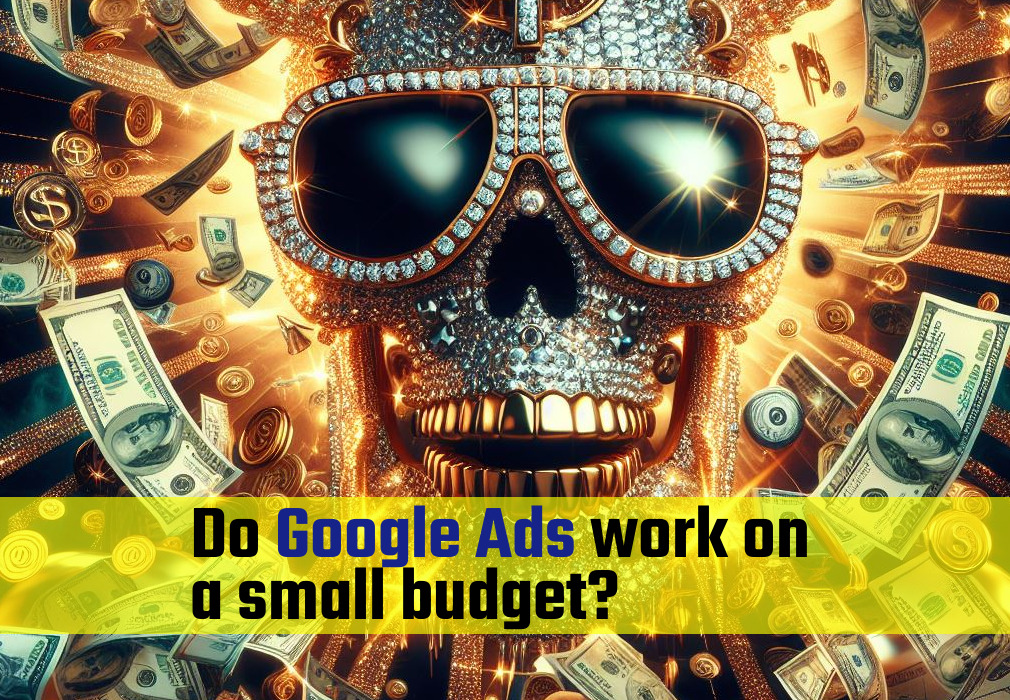

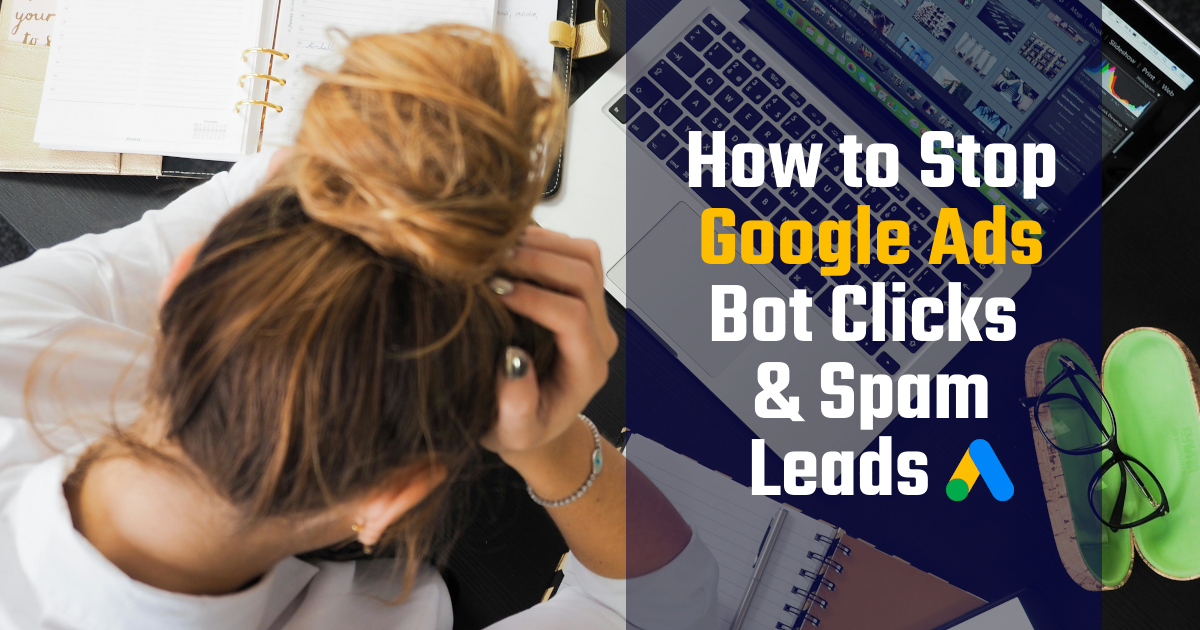
![How to Use Google Ads for Limo Services [Updated 2025]](https://marlinsem.com/wp-content/uploads/2024/01/limo-company-advertising-google-ads-2025.png)
